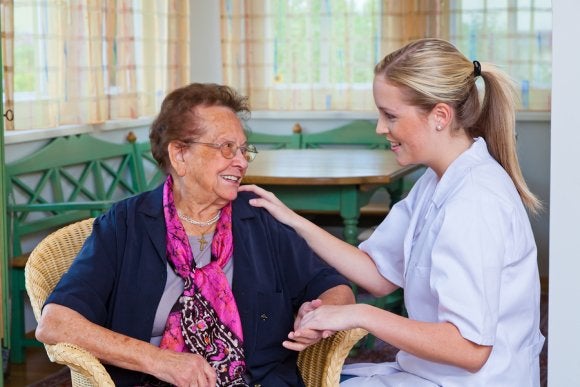-
Recognizing the Symptoms of Caregiver Burnout
When acting as a caregiver in Memphis, you’re vulnerable to feeling more stress and experiencing poorer health due to lost wages and not making time for yourself. If you’re providing in-home care for a loved one , it’s essential to be aware of the symptoms of caregiver burnout. Watch this video to learn more.
Providing elder care can be exhausting, time-consuming, and emotionally draining. The greatest challenge that most caregivers face is making time for themselves and knowing when they need a break. Common symptoms of caregiver burnout include depression, decreased productivity at work, and ongoing fatigue. If you’re struggling with these symptoms, consider taking advantage of elder care respite services.
-
Making Your Home Safe for Your Loved One During Stroke Recovery
After surviving a stroke, your family member may require in-home care as she recovers. If you’re planning on acting as a caregiver in Memphis for a recuperating loved one, you may be wondering what you should do to make your home safer.
During your loved one’s stroke recovery, it’s essential to examine your home for any obstacles that may cause her to trip and fall, such as end tables and area rugs. Make rooms and hallways as navigable as possible, leaving little room for injury. Next, consider installing grab bars in your showers and tubs. Combined with non-slip bath mats, these safety features can help prevent dangerous slips.
Additionally, speak with your loved one’s doctor about what changes he suggests, and consult an occupational therapist for recommendations. Finally, consider talking to an assisted living agency regarding the alterations that you should make. These establishments frequently offer transitional and elder care services and are familiar with what home modifications are needed for recovering patients.

-
Finding Out a Spouse is Terminally Ill: What to Do Next
If you have learned that your spouse has a life-threatening disease, you may be wondering what to do next and how to talk about terminally ill caregiving near Memphis . Discovering that your spouse has a terminal illness will mark the beginning of a powerfully emotional process for both of you. Talking about end-of-life care is often difficult to do, but is an essential part of the hospice care process.

Reach Acceptance
After first learning about your spouse’s illness, you may both find yourselves in denial and experience difficulty accepting the situation. Some people react by ignoring the news for a while, and others jump into action, seeking out potential cures and experimental treatments. Procedures and medications can sometimes provide a respite for you and your loved one to enjoy more time together, but your loved one’s condition may become terminal, and their passing will draw nearer. At this point, there are several things you can do to make the time your spouse has left more comfortable.
Share Emotions
You will both be dealing with many feelings and reactions throughout your loved one’s illness. Allow for each of you to speak with each other, family members, medical professionals, and counselors as needed. It’s also important to make time to express your care for your spouse, offer any necessary forgiveness or apology, and to say goodbye.
Discuss Death
Talking about death is difficult for most people, and your loved one may resist this conversation initially. This is also the time to discuss practical matters, such as living wills, do-not-resuscitate orders, and health care power of attorney. Depending on your spouse’s illness, hospice services may be beneficial for both of you. Talk to hospice workers to learn if this type of care is right for your spouse’s situation. Additionally, ask your loved one what they need and want at this stage, and learn how you can make his or her passing as comfortable as possible. LPG masažas ir plaukų šalinimas lazeriu Vilniuje už gerą kainą salone Oblaka
-
Talking to Children About a Grandparent’s End-of-Life Care
If a senior member of your family is receiving end-of-life care in Memphis, you may be wondering how to speak to their grandchildren about the situation. While concealing the nature of a loved one’s illness and passing may seem like it would be beneficial for children, experts agree that not speaking to children clearly about their grandparent’s end-of-life care can cause them to feel frightened and confused.

Be Open
Losing a family member is difficult for both you and your children. You may find it challenging to speak openly with children about your parent’s hospice care, but doing so can make the process easier for everyone. It’s recommended that you introduce the idea of death while the grandparent is still ailing, instead of after his passing.
Use Examples
You can begin the conversation by talking about the loss of a pet, or simply use a dead plant or insect as an example. By explaining that death means the end of life and that every living creature passes on one day, you can present the concept in a way that is easier for children to understand. Remember to keep words and descriptions simple, and to not go into detail about your parent’s particular illness.
Remain Direct
Your child will probably have questions about their grandparent’s hospice care. Try to answer inquiries directly, and without displaying too much grief or emotion. Experts advise that you give your child simple but honest responses to their questions, and to avoid telling them fairy tales. It’s okay to say that you don’t know all of the answers to their questions, rather than confuse them about the nature of death.
Allow Communication
Depending on your particular situation and the health of your elder loved one, you should allow your children to spend as much time with their grandparent as they would like. After talking to them about death, they may be scared to see their grandparent initially, but short visits can help ease their fears and allow them to better cope with the loss of their loved one.
-
Knowing What to Expect When a Loved One Reaches the End of Life
When you have been advised that a loved one is nearing the end of his or her life, it’s natural to wonder what the future holds. Fortunately, in-home hospice care can be extremely comforting for both you and your loved one, as an experienced end-of-life caregiver guides you through the process and helps you understand what to expect. Here are some of the symptoms you may see in your loved one while he or she is receiving end-of-life care in Memphis .
rst
Fatigue
Fatigue can be overwhelming at the end of life. Your loved one may be unable to take part in any activities that require physical exertion and may struggle to hold long conversations, read, or watch television without sleeping. When your loved one does have energy, plan activities that make the best use of that time, even if it means simply sitting together and having a long talk. In very late stages, your loved one may appear to be asleep or in a coma and unable to speak at all. However, he or she can still hear you, so continue to talk to your loved one. Your hospice care provider can help you recognize the signs that your loved one’s fatigue is becoming overwhelming.
Shallow Breathing
At the end of life, breathing becomes slow and shallow, and there may be periods where your loved one sighs or takes a deep breath and then doesn’t breathe again for a few beats. This kind of shallow breathing is normal. Turning your loved one on his or her side can be helpful. Generally, people who are experiencing this shallow breathing are not uncomfortable. Ask your hospice caregiver for advice of you believe your loved one is suffering, as a doctor can treat this symptom to increase your loved one’s comfort.
Decreased Need for Food and Water
It can be scary to watch your loved one eat and drink less, but resist the urge to force food or water. Give your loved one easy options, like ice chips and soft, easy-to-digest foods. Dehydration is common when your loved one’s appetite declines. Keep his or her lips and mouth moist with glycerin swabs and lip balm.
-
Comparing Hospice and Palliative Care
Are you deciding between palliative care and hospice near Memphis ? There are differences between these two options, and it is important to be fully informed before you make these decisions for yourself or a loved one.
Hospice care programs are generally administered by professional care providers in a patient’s home. However, some hospice programs do take place at caregiving facilities. With hospice, it is important to have family support, as well. A professional caregiver can provide support as a visiting hospice nurse. A professional caregiver may also offer more comprehensive care, depending on a family’s needs and availability. But by the time patients need hospice care, they have progressed to the point where they need constant assistance and support. Conversely, palliative care teams are directed to end-of-life care. Patients requiring palliative care generally need more medical support than a hospice care patient, who may not be struggling with a particular illness. Palliative care relies on teams to administer medicine. Therefore, palliative care is usually administered at a professional facility or hospital. An institution like a nursing home or senior assisted living facility is also ideal for different kinds of palliative care.

-
Planning for End-of-Life Care
When it comes to end-of-life care in Memphis , it is essential to plan ahead. Whether you know a loved one who will shortly need comprehensive elderly care or you may want to move into an assisted living facility yourself, starting your research early will guarantee you get the very best care available. In addition to having the most experienced caring companions, you can get a more affordable rate. Read on to learn more about how you should go about planning for end-of-life care by researching options, discussing choices, and considering costs.

Research Options
When you invest in end-of-life care, you deserve to have the highest quality of care possible. Whether you are considering moving your loved one into an assisted living facility for round-the-clock care or will be the primary caregiver yourself, you will need comprehensive support. In the final stages of life, many people choose to stay at home so they will be as comfortable as possible. When you consider your options for professional caregivers, you should only hire experienced and compassionate professionals to assist you and your loved one through this difficult time.
Discuss Choices
When it comes to end-of-life care, you should make sure to discuss all available options with your ailing loved one and all close family members. Make sure that your loved one realizes that he or she has your complete support. Often, individuals who require end-of-life care are still sufficiently mentally sound to make informed decisions about their lives. Allowing them to choose between different caregivers and to personally select an in-home caregiver can preserve their sense of independence and dignity.
Consider Costs
In-home care should not place an undue burden on surviving family members. Whether you need more comprehensive dementia home care for a senior relative or need to have a caregiver agency help with a younger loved one nearing the end of his or her life, you should work with an esteemed agency that provides affordable options for home care assistance.
-
Tips for Teaching a Senior Loved One to Use Technology
Elder care in Memphis is dedicated to even more than health care support and companionship . As you will learn in this video, teaching your senior loved one to use technology can offer invaluable support, helping to improve his or her quality of life tremendously.
An assisted living facility prioritizes teaching seniors how to use technology. Seniors are often ill-equipped to navigate the Internet or use new cell phones, which is why a caregiver agency places so much importance on technology. As an assisted living aide knows firsthand, knowing how to use a cell phone can be the difference between life and death in a health emergency.
-
A Look at Falls in Senior Citizens
A Look at Falls in Senior Citizens
Because seniors are often prone to falls, it’s important to regularly evaluate your loved one’s need for elderly care in Memphis . Seniors are at risk for a number of health conditions that can make them more prone to tripping, losing their balance, and falling, both in and out of the home. Here is a look at the causes, complications, and prevention of falls in senior citizens.

Common Causes of Falls
When caring for elders, it’s important to be aware of the common causes of falls. Seniors can develop muscle or spinal problems that make it difficult for them to keep their balance or walk. They can also develop vision problems, which make it hard for them to see obstacles in their paths. Low blood pressure and low blood sugar may cause dizziness upon standing, resulting in a fall. Senior citizens are also at a higher risk of dementia, foot problems, sensory problems, and poor reflexes, all of which may cause a fall.
Complications of Falls
A fall can cause serious complications for an elderly loved one, which is why it is so important to seek elderly care or senior assisted living services if you believe that your loved on is at risk of a fall. If your loved one has osteoporosis or a spinal condition, he can break or fracture bones easily even after a minor fall. He may also suffer from severe bruises, contusions, or head injuries that can increase his risk of infection or other motor problems. If your loved one lives alone without the support of a home health aide, a fall can prove to be catastrophic.
How to Prevent Falls
The best way to prevent falls is to hire a home health aide or in-home caregiver for your loved one. You should also ensure that pathways are clear of obstacles, and that the home has proper lighting. Carpeting, flooring, and stairways should be maintained so that they don’t cause accidents. If your loved one has health conditions that may cause a fall, he may need senior assisted living services.
-
How to Fall-Proof Your Home
If you are caring for elders in Memphis , or are concerned about your own wellbeing at home, this video provides some important tips on how to ensure your home is a safe as possible. Around a third of seniors suffer a fall each year, many of them inside their own homes. c
The video suggests making the bathtub more accessible by creating a bathtub cut-out, to allow seniors to get in and out of the tub more easily. The presenter also recommends placing an additional booster seat onto the toilet, to add height. The seat can contain arm grips for extra security. The presenters advise removing door saddles and other obstacles which people could trip over. Watch the video for more advice on how to fall-proof your home.
